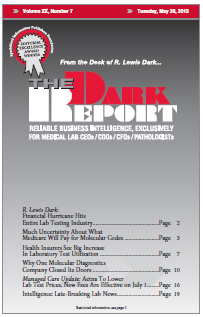IN RECENT MONTHS, labs are reporting the receipt of letters from Aetna, Inc., announcing that it will pay dramatically less than Medicare prices for many key lab tests. Aetna said that these lower prices will take effect on July 1, 2013. Three examples illustrate the deep fee cuts that Aetna is attempting to push onto …
Aetna To Lower Lab Test Prices, New Fees Are Effective on July 1 Read More »
To access this post, you must purchase The Dark Report.


